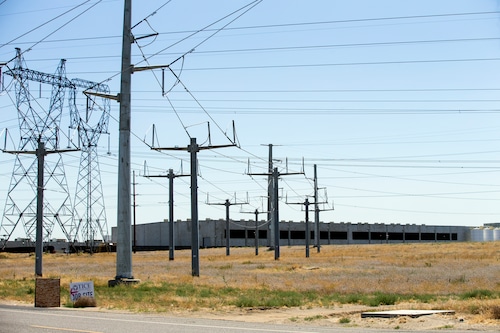The IT sector will use as much electricity as possible, a panel of data center industry experts warned Northwest energy planners on Wednesday, threatening dire repercussions if the region doesn’t act quickly.
According to Robert Cromwell, a consultant for Northwest power providers, the region will need to develop more transmission more quickly than it has in the previous 70 years. He claimed that because the region’s capacity to supply electricity is already approaching its peak energy demand, rolling blackouts are already a possibility.
Artificial intelligence, which requires enormous quantities of electricity for sophisticated processing, is driving up demand for data centers. More than 10% of Oregon’s electricity is being used by these strong machines, and by 2030, data centers are expected to need at least twice as much power, if not more.
According to Cromwell, recurring blackouts are unavoidable during periods when electricity demand is at its highest if the Northwest does not install enough generation and transmission to fulfill the expanding energy needs. He referred to rolling blackouts, which momentarily turn off power to residences, workplaces, and even hospitals that depend on energy to deliver life-saving care, using an industry phrase called rotating load shedding.
Cromwell told the Northwest Power and Conservation Council on Wednesday that nothing will change policy more quickly than elected officials attending constituent funerals, and that it won’t be for the better since it would be reactionary and ill-considered.
Due in significant part to some of the most generous tax advantages in the world, Oregon boasts one of the largest and fastest-growing data center sectors in the country. Although there aren’t many jobs in data centers, the affluent tech firms that operate them benefit from more than $225 million in tax breaks from Oregon each year.
In central and eastern Oregon, massive data centers are run by Amazon, Apple, Google, and Meta. Hillsboro is home to massive installations for a number of major businesses, such as Oracle, LinkedIn, and the social network X.
The power council released a projection earlier this year that outlined a number of potential scenarios for data center power usage by the end of the decade. According to the council’s medium scenario, data centers in the Northwest would require an extra 4,000 megawatts of electricity on average by 2030.
That is a huge increase in demand, equal to three million houses’ worth of electricity use.
Cromwell, however, stated on Wednesday that the council’s median forecast is too low.
He answered, “Your high case is probably pretty close to spot on, and your medium case is not high enough.”
According to the optimistic projection, data centers will require an extra 6,500 megawatts on average over the next five years, which is equal to the electricity requirements of about 5 million households.
There s no question in my mind that the demand for computation and AI, and the demand to plug in (computer processors), exceeds the available power that we have by 2030, said Brian Janous, a former Microsoft vice president now consulting for industrial electricity users.
Janous and others told the council on Wednesday that there is little chance of slowing that expansion by moving demand to other data centers during peak hours or by creating more effective computers. According to him, data center owners will use all of the electricity they can acquire and run all of their equipment around the clock because of the strong demand for artificial intelligence.
When power demand exceeds supply, during winter storms or heatwaves for example, utilities and governments must make wrenching decisions about who loses power and for how long. Although it would have its own drawbacks, cutting off electricity to data centers may protect hospitals and residences.
According to panelist Sarah Smith of the Lawrence Berkeley National Laboratory, consider the flawed CrowdStrike software update from last summer. That took down banks, hospitals, factories, news sites and many others as online systems went awry.
Air travel was disrupted for days, Smith said. There was a lot of really wide-ranging impacts you could imagine.
The Northwest Power and Conservation Council is a regional organization that works with utilities and governments in Idaho, Montana, Oregon and Washington to balance future power needs and environmental protections. It convened Wednesday s panel on data centers to help plan a new forecast the council will issue next year.
Big tech companies generally accept the scientific consensus that carbon emissions are causing climate change. Until recently, most tech companies expressed public commitments to find renewable power for their data centers.
Recently, though, Janous said they ve become willing to compromise, in the short run on their clean power goals because they re desperate for any source of electricity.
Despite the data centers voracious appetite for power, the panelists expressed some hope that the region will be able to meet the challenge and, in time, push data center operators to return to their clean energy aspirations. They suggested a Northwest regional transmission authority, long under discussion, could help streamline the construction of new power lines and collaboration among western states.
Data centers power needs are triggering expensive upgrades to the Northwest s power lines and prompting construction of new power plants. There is growing concern among ratepayer advocates, regulators and politicians thathouseholds will end up bearing much of the cost of data center growththrough higher residential power bills.
On Wednesday, panelists said data center operators are highly motivated. They said tech companies probably would be willing to bear the cost of additional power themselves, provided they have a pathway to get that energy quickly.
The companies that are asking for this infrastructure are extraordinarily deep-pocketed and there s a huge willingness to pay, Janous said, because the returns they earn on the back end are massive.
–Mike Rogowaycovers Oregon technology and the state economy. Reach him [email protected].
Your support is essential to our journalism. Please become a subscriber today atOregonLive.com/subscribe
Note: Every piece of content is rigorously reviewed by our team of experienced writers and editors to ensure its accuracy. Our writers use credible sources and adhere to strict fact-checking protocols to verify all claims and data before publication. If an error is identified, we promptly correct it and strive for transparency in all updates, feel free to reach out to us via email. We appreciate your trust and support!




